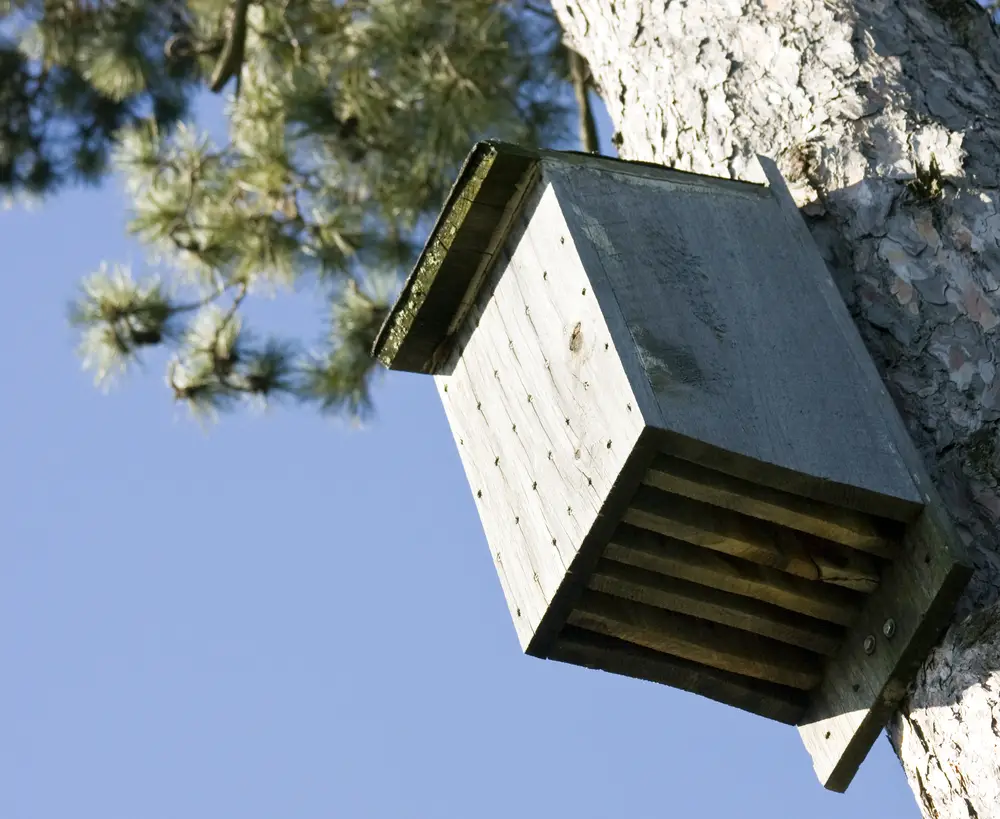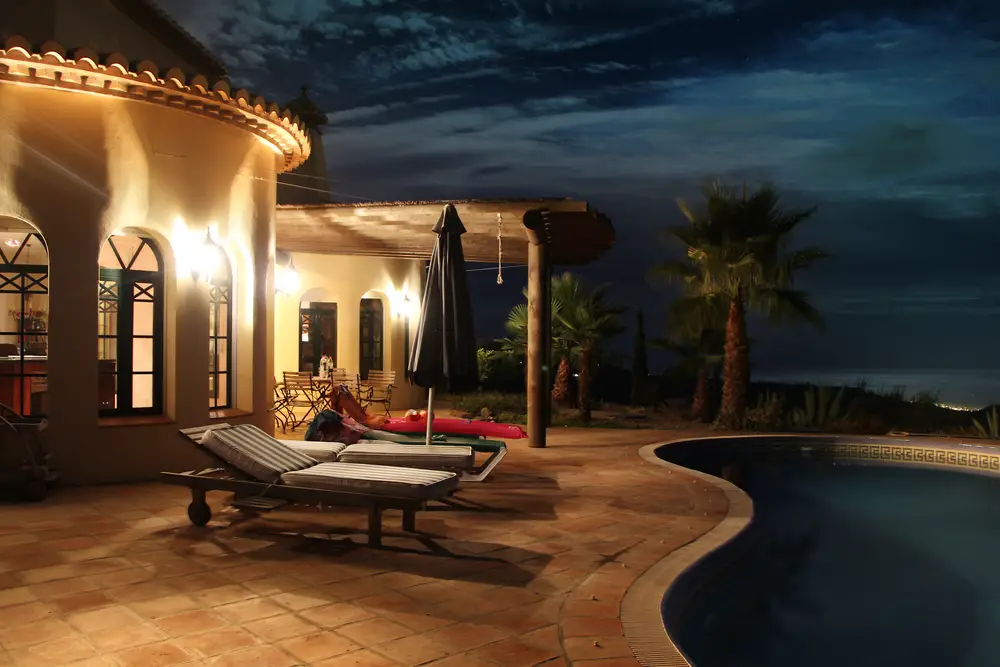Bats play an essential role in our ecosystem by consuming insects and pollinating plants, but they can also become unwanted visitors in our backyard pools.
It is important to ensure that our bat neighbors do not share the water we swim in, as their droppings can pose health risks, and their presence can be unpleasant.
Quick Answer:
- Cover Pool: Use a pool cover at night when bats are most active. This prevents them from accessing the water.
- Lighting: Install bright, motion-activated lights around the pool. Bats are deterred by bright lights.
- Water Features: Minimize water features like fountains that may attract bats due to the insects they attract.
- Bat Repellents: Use an ultrasonic bat-repellent device around the pool area. These emit high-frequency sound waves that bats dislike.
During warm summer evenings, it is not uncommon to spot bats flying around the pool premises in search of food.
Their natural navigational skills often bring them in close proximity to human dwellings, and having a pool can be enticing for them.
Understanding Bats and Their Behavior
Bats are fascinating creatures that play an essential role in our ecosystems. They are the only mammals capable of true, sustained flight, and they use a unique navigational system called echolocation to help them find their way in the dark.
Bats generally live in groups called colonies, which can range from a few individuals to thousands, depending on the species.
They are mostly nocturnal creatures, coming out at dusk to feed on insects, nectar, fruits, or, in the case of some species, small vertebrates like frogs. Bats are also known for their roosting behavior, finding shelter in caves, tree hollows, or even man-made structures during the daytime.
Echolocation is a crucial aspect of bat behavior. Bats emit high-frequency sounds that bounce off objects in their environment, allowing them to detect and locate their prey even in complete darkness.
This sophisticated system helps them avoid obstacles and navigate through complex environments while also enabling them to find suitable roosting sites.
One primary reason that bats may be attracted to your pool area is the insects drawn by the water, particularly if you have nearby fruit trees or flowering plants. Bats are often seen swooping over pools to catch a quick meal, but they typically do not intend to take up residence there.
Preventing Bats Around Your Pool Area

Bats are fascinating creatures, but you might not want them flying around your pool area. Luckily, there are a few practical steps you can take to prevent bats from being attracted to your pool.
First, consider adding a bright light to your pool area. Bats are nocturnal and typically avoid well-lit places. By illuminating your pool, you will create an uninviting environment for these nighttime flyers.
Next, netting can be an excellent method to keep bats at bay. Install fine mesh netting around your pool’s perimeter, making sure it’s secured tightly to prevent any gaps. The netting will create a physical barrier that prevents bats from entering the area.
Pool covers can also help to deter bats by eliminating access to the water’s surface. Choose a pool cover that fits securely and completely covers the water’s surface, ensuring that bats cannot enter the pool. Not only will this help keep bats away, it’ll also help maintain the cleanliness of your pool.
Another tactic is installing mirrors around your pool area. Bats rely on echolocation for navigation, so the mirrors can confuse and disorient them. Place mirrors in strategic locations around the pool, reflecting light and creating an unfriendly environment for the bats.
Natural Bat Repellents and Deterrents
Bats can sometimes be a nuisance around your pool, but there are natural and effective ways to keep them away. In this section, we will explore some natural repellents and deterrents that can help you maintain a bat-free environment.
Natural Repellents: Essential oils, such as peppermint and eucalyptus, can be used as a natural bat repellent. Simply mix a few drops of essential oil with water in a spray bottle and apply it around the pool area, focusing on any potential roosting spots. Refresh the solution every few days to maintain its effectiveness.
A homemade bat repellent can also be made using a combination of water, dish soap, and hot sauce. Mix a few tablespoons of dish soap with a teaspoon or two of hot sauce in a gallon of water, then spray the solution around the pool area. Like essential oils, this might need to be reapplied regularly.
Sonic Repellers: Ultrasonic devices generate high-frequency sounds that can deter bats without being harmful to them or humans. These gadgets can be placed around the pool area to discourage bats from getting too close. Some sonic repellers are even solar-powered, making them an energy-efficient option.
No products found.
Physical Deterrents: Bats like to roost in dark and quiet places, so keeping the pool area well-lit can help to discourage them. Installing motion-activated lights can be an effective way to keep bats away while also conserving energy.
Professional Help and Pest Control
When dealing with a bat infestation near your pool, it’s wise to consider consulting a professional exterminator with experience in bat control. Professionals have the necessary knowledge, techniques, and equipment to address the problem effectively and safely.
Resolving a bat infestation often involves a two-step process: exclusion and prevention. A pest control expert will first perform an inspection to identify and seal any potential entry points the bats are using to access your property. This may include gaps or openings in the roof, eaves, or walls that need to be closed.
Once entry points have been sealed, the exterminator will set up a bat exclusion device. These specialized tools allow the bats to safely leave the area while preventing them from returning.
After the bats have been successfully excluded, the expert will also recommend long-term prevention methods to keep them away from your pool in the future.
Some possible prevention methods may include:
- Installing motion-activated lights or ultrasonic repellers around the pool area, as these can help deter bats from roosting nearby
- Regularly pruning trees and clearing away any fallen leaves or debris that could provide cover for bats
- Ensuring that structures in your property, such as sheds or gazebos, are well-maintained and sealed to prevent bats from roosting
The Importance of Bat Houses

A bat house is an essential and effective way to keep bats away from your pool while also providing them with a safe place for nesting. Bats play an important role in our ecosystem; they help control insect populations and pollinate plants.
By installing bat houses near your property, you allow bats to have a dedicated place to roost, which reduces their likelihood of taking up residence near your pool.
When choosing a bat house, consider the size and the entrance design. Bats prefer tight spaces, so ensure your bat house has a narrow entrance and multiple chambers for them to feel secure. Ideally, the house should accommodate at least a few dozen bats.
To increase the effectiveness of the bat houses, install them at a proper height above the ground – generally 12 to 20 feet – and away from areas with bright lights or frequent human activity.
Additionally, the bat houses should be placed in a spot that receives plenty of sunshine throughout the day. This helps create a warm environment that bats are more likely to be attracted to.
- Great Bat Shelter – Makes Bats Feel At Home: The 16.5×10.2×4” large bat houses with the efficient two chamber design offer an ideal roosting area for bats; Thanks to the dark brown cedar Kibaga bat…
- True Ecosystem Idols: Bats are vital as pollinators & seed dispensers which makes them crucial for our ecosystems and functional economic agricultures; Set up a bats house to support these versatile…
- Eco-Friendly: Introducing a bat habitat provides many benefits – one of them, having a approach against mosquitoes & other insects, that are not only pesky but also damage crops & plants
Once you have your bat houses in place, regular maintenance is essential. Keep the area around the houses clean and free of debris, as this could obstruct the entrance or deter bats from nesting within. Inspect the interior chambers for potential damage from predators or weather, and repair any issues as needed.
Keeping Your Property Unattractive to Bats
Bats can be a nuisance, especially if they decide to make your property their home. In order to keep bats away from your pool area, it’s important to make your property unattractive to these creatures. Here are a few tips to help you achieve that goal.
Inspect your property for any holes or gaps that might allow bats to take shelter. Bats can squeeze through spaces as small as 3/8 of an inch, so be thorough in your inspection. Seal any openings you find around your attic, roof, or walls with caulk or expandable foam.
Keeping your property free of standing water can also help deter bats. Bats are attracted to water sources for drinking and hunting insects, so eliminating these attractions will make your property less appealing.
To do this, make sure to regularly clean and maintain your pool area, fix any leaking taps or hoses, and remove any stagnant water in birdbaths or other outdoor containers.
Bats are also less likely to congregate in well-lit areas. Installing motion-activated lighting around your property can help keep bats at bay. Just make sure to use warm-colored outdoor lights, as cooler-toned lights attract more insects which, in turn, can attract bats.
Finally, trimming back any overhanging tree branches near your home and pool can also help to discourage bats from roosting nearby. This will not only make it more difficult for them to access your property but also reduce the number of hiding spots close to your pool area.
Safety Measures and Legalities
Taking proper safety measures is crucial to reduce health risks associated with bats around your pool.
Bats can carry rabies and other diseases, posing a potential threat to your well-being. If you come across a bat, it is important to avoid handling them with bare hands. In case you need to handle a bat, wear thick gloves and use a towel or net.
While it may be tempting to eliminate the bat population around your pool, it’s important to note that it is illegal to kill bats in many regions. Bats are protected species due to their role in controlling pests and pollinating plants. Thus, taking aggressive measures to kill them may result in legal consequences.
Instead of targeting bats directly, focus on making the pool area less attractive to them. Here are some suggestions to deter bats effectively:
- Clear the surroundings: Keep trees and bushes trimmed, and clear away any debris that could serve as potential roosting sites for bats.
- Install barriers: Place nets or screens around the pool to prevent bats from accessing the water. Ensure these barriers are bat-friendly to avoid harming them.
- Light up the area: Bats are more active during the night. Installing bright lights around the pool can discourage their activity in the area.
Keep in mind that although bats pose some health risks, they are unlikely to attack humans and are generally not dangerous to be around.
Accidents such as bats getting drowned in the pool can be easily prevented with the aforementioned measures.



